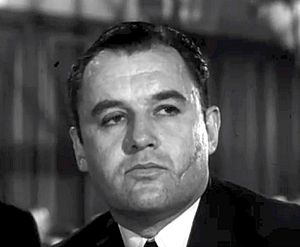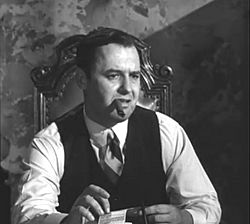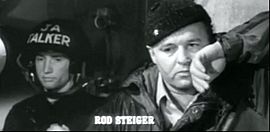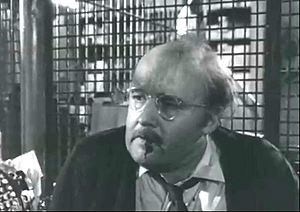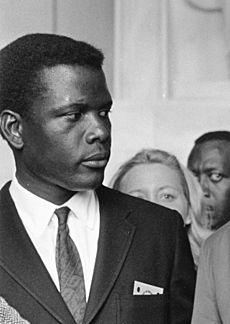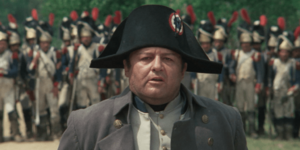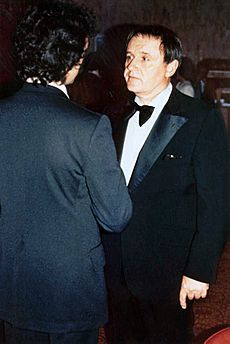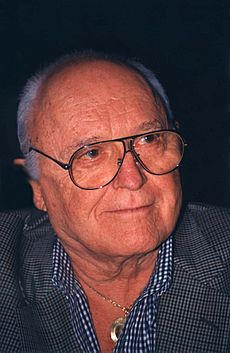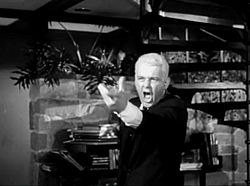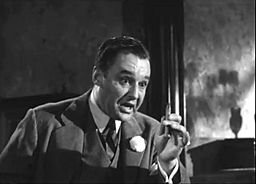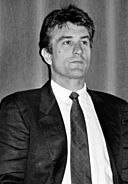Rod Steiger facts for kids
Rodney Stephen Steiger (born April 14, 1925 – died July 9, 2002) was a famous American actor. Many people called him "one of Hollywood's most exciting and powerful stars." He was known for a special acting style called method acting. This meant he deeply understood and became the characters he played. Sometimes, this led to disagreements with directors and other actors.
Rod Steiger starred in several important movies. He played Charley, the mobster brother of Marlon Brando, in On the Waterfront (1954). He was also the main character, Sol Nazerman, in The Pawnbroker (1964), which won him an award for Best Actor. Later, he played police chief Bill Gillespie alongside Sidney Poitier in In the Heat of the Night (1967). For this role, he won the highest award in acting, the Academy Award for Best Actor.
Steiger was born in Westhampton, New York. His mother was a performer in Vaudeville, a type of stage entertainment. He had a tough childhood and left home when he was 16. After serving in the Navy during World War II, he started acting on television in 1947. He became well-known for his role in the TV play "Marty" (1953). He also performed in many plays on stage, starting in 1946.
Rod Steiger made his first movie, Teresa, in 1951. He then appeared in films like The Big Knife (1955) and Oklahoma! (1955). After his powerful performance in The Pawnbroker (1964), he played a Russian politician in Doctor Zhivago (1965). In the Heat of the Night (1967) won five Academy Awards, including Best Picture.
In the 1970s, Steiger looked for more challenging roles in European movies. He played Napoleon Bonaparte in Waterloo (1970) and a Mexican bandit in Duck, You Sucker! (1971). He also played Benito Mussolini in Last Days of Mussolini (1975). By the 1980s, health issues made it hard for him to find work. He appeared in some smaller movies. One of his last roles was as Judge H. Lee Sarokin in The Hurricane (1999).
Steiger was married five times. He had a daughter, opera singer Anna Steiger, and a son, Michael Steiger. He passed away on July 9, 2002, at age 77, due to health problems after surgery.
Contents
Early Life and Start in Acting

Rodney Stephen Steiger was born on April 14, 1925, in Westhampton, New York. He was the only child of Lorraine and Frederick Steiger. His family had roots in France, Scotland, and Germany. Rod was raised as a Lutheran. He never met his father, who was a talented musician and dancer. His father was part of a traveling song-and-dance team with Rod's mother.
Rod's mother had a beautiful singing voice. She almost became a Hollywood actress. However, a leg surgery made it hard for her to walk, so she stopped acting. She left show business and moved from Westhampton to raise her son. They moved several times before settling in Newark, New Jersey.
When he was a child, Rod was strong and big. People called him "The Rock." He was popular at school and a good softball player. He liked writing poetry and acting when he was a teenager. He performed in several school plays at West Side High School in Newark. At 16, he left home and joined the United States Navy during World War II.
Serving in World War II
Rod Steiger joined the Navy on May 11, 1942. He trained in Newport, Rhode Island. On May 20, 1944, he joined the USS Taussig, a destroyer ship. As a torpedoman, he fought in the South Pacific, including the Battle of Iwo Jima. Steiger later said he thought he was being heroic in the Navy. His war experiences stayed with him for life, especially the loss of American soldiers. He also remembered when the Taussig sank ships that had women and children on board.
On December 17, 1944, near Luzon in the Philippines, Steiger and the Taussig faced Typhoon Cobra. This storm had winds of 115 miles per hour and 80-foot waves. Three U.S. destroyers were lost, but the Taussig survived. Steiger tied himself to the deck to avoid being washed away by the huge waves.
Beginning His Acting Journey
After the war, the GI Bill helped Steiger pay for his rent and schooling in New York City. He first worked oiling machines and washing floors. He decided to take a drama class because many attractive young women were in it. This led him to study at the New School for Social Research. During one audition, he got a role after saying only a few words. The director said he had a "fresh, wonderful quality." Steiger was surprised to find he had a talent for acting. He was encouraged to study more at the Dramatic Workshop. His acting hero was Paul Muni. He also admired French actor Harry Baur and loved Charlie Chaplin.
Acting Career Highlights
Early Roles and Big Break (1946–1956)
Rod Steiger first acted on stage in 1946 in a play called Curse you, Jack Dalton! He was then invited to the Actors Studio, started by Elia Kazan in 1947. There, he studied method acting with actors like Marlon Brando and Eli Wallach. This style of acting became a big part of his career. Since he didn't look like a typical leading man, he decided to become a character actor. He continued acting on stage, getting his first major Broadway role in Night Music (1951).
Steiger had many early roles, especially on television in the early 1950s. He appeared in over 250 live TV shows in five years. He saw TV as a great place to try out different roles and improve his acting. Critics like John Crosby praised his "effortless persuasive performances." He appeared in shows like Danger and Lux Video Theatre. He also played Shakespeare's Romeo in a 1954 episode of You Are There.
Steiger made his first big movie appearance in 1953 in Teresa. He impressed the director, Fred Zinnemann, with his confidence. Zinnemann remembered Steiger as "very popular" and "full of remarkable memories."
On May 24, 1953, Steiger played the main role in "Marty" on TV. He played a lonely butcher from the Bronx looking for love. This role was a big success and made Steiger famous. Critics said he brought "striking intensity" to his performance. Steiger refused to sign a long-term studio contract, so Ernest Borgnine played Marty in the 1955 movie version. That movie won the Academy Award for Best Picture. 1953 was a breakthrough year for Steiger. He won awards for Marty and other performances.
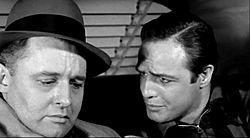
For his role as Charley "the Gent" in Elia Kazan's On the Waterfront (1954), Steiger was nominated for an Academy Award for Best Supporting Actor. He played the brother of Marlon Brando's character.
Steiger played Jud Fry in the movie musical Oklahoma! (1955). He even did his own singing. He played Jud as a troubled and lonely character. This made the character more complex than a simple villain. Steiger also acted in The Big Knife (1955), where he played a tough film boss. He prepared for this role by reading about the Treblinka extermination camp to understand his character's dark side.
Later in 1955, Steiger received praise for his role as a prosecuting major in The Court-Martial of Billy Mitchell, alongside Gary Cooper.
More Film Roles (1956–1963)
Steiger played "Pinky" in the western movie Jubal (1956). He played a rancher who becomes jealous. Steiger didn't enjoy making this film and often argued with the director. However, critics were impressed with the "evil venom" his character showed. In The Harder They Fall, Steiger played a boxing promoter. He worked with Humphrey Bogart in his last film role. Steiger called Bogart "a professional" with "tremendous authority."
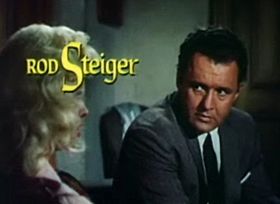
In 1957, Steiger appeared in The Unholy Wife. He played a rich winemaker who marries a dangerous woman. He also played a Confederate veteran in Run of the Arrow. Steiger injured his ankle during filming, so a Native American extra had to run in his place. Later that year, Steiger starred in the British thriller Across the Bridge. He played a German conman hiding in Mexico. Film critic Dennis Schwartz said Steiger gave "one of his greatest performances."
In 1958, Steiger played a criminal mastermind in Cry Terror!. The next year, he appeared with Claire Bloom (who he later married) in a stage play called Rashomon. This play was a big success and earned Tony Award nominations. The same year, Steiger played the famous mobster Al Capone in the movie Al Capone. Steiger wanted to show Capone's flashy side. The film showed Capone in a less glamorous way. This role earned Steiger an award nomination.
After Al Capone, Steiger played a clever thief in the heist film Seven Thieves (1960). He planned to steal $4 million from a casino vault. Critics praised the film's "nerve-rackingly delicate plot." The next year, he played a prison psychiatrist in The Mark. His performance was so real that a psychiatric institution called him for a meeting. Steiger also started appearing in more films in Italy and France. He felt he had more respect as an actor in Europe.
In 1962, Steiger was in a Broadway play called Moby Dick—Rehearsed. He also played a detective in 13 West Street. Steiger had a small role as a destroyer commander in the big war movie The Longest Day (1962). This movie had many famous actors like John Wayne and Henry Fonda. The next year, Steiger played a powerful land developer in the Italian film Hands over the City (1963).
Becoming a Mainstream Star (1964–1969)
After Hands over the City, Steiger made another Italian film, Time of Indifference (1964). Then, in Sidney Lumet's powerful drama The Pawnbroker (1964), Steiger played a Holocaust survivor living in New York City. His character was very sad and withdrawn. Steiger took a lower payment for this role. He read the book and script many times to understand the character deeply. He also asked to have fewer lines to make his character seem more realistic and lonely.
Steiger believed The Pawnbroker was his best work. He especially remembered the last scene where he finds a boy dead. He said that was the "highest moment" of his talent. He was inspired by Pablo Picasso's painting "Guernica" for this scene. Critics praised his performance, and he won Best Actor at the Berlin International Film Festival. He also received his second Oscar nomination for Best Actor. Steiger was surprised when he lost the Oscar to Lee Marvin.
In 1965, Steiger played an embalmer in the comedy The Loved One. His next role was Komarovsky in David Lean's Doctor Zhivago (1965). This was one of his favorite roles. Steiger was one of only two Americans in the cast. He was worried about working with great British actors like Ralph Richardson. But he was happy that he fit in well. The film was a huge success worldwide and is considered one of the greatest films ever made.
Steiger won the Best Actor Oscar for his role as Chief of Police Bill Gillespie in In the Heat of the Night (1967). He played a Southern police chief looking for a murderer. Sidney Poitier, who starred with him, said Steiger was one of the finest actors he had ever worked with. Steiger won many other awards for this role, including a BAFTA and a Golden Globe.
In 1968, Steiger starred with George Segal in the comedy thriller No Way to Treat a Lady. Both the film and Steiger's acting were highly praised. Later in 1968, Steiger played a military officer in The Sergeant. He won an award for this role.
Steiger then appeared in the science fiction movie The Illustrated Man (1969). The film was not very successful. However, Steiger had better luck later that year with Claire Bloom in the British drama Three into Two Won't Go.
Historical Roles and Later Career (1970–2002)
Steiger was offered the main role in Patton (1970), but he turned it down. He said he didn't want to make war seem glorious. George C. Scott took the role and won an Oscar. Steiger later called this his "dumbest career move." Instead, he chose to play Napoleon Bonaparte in Waterloo (1970).
In 1971, Steiger played a big game hunter in Happy Birthday, Wanda June. He then starred with James Coburn as a Mexican bandit in Sergio Leone's Duck, You Sucker!. Steiger and Leone had some disagreements during filming, but they were happy with the final movie. Steiger tried out for the role of Michael Corleone in The Godfather (1972), but he was considered too old.
Steiger played a rural father in Lolly-Madonna XXX (1973). He also appeared in the Italian war comedy The Heroes and as a mobster in Lucky Luciano.
In 1975, Steiger played Italian dictator Benito Mussolini in Last Days of Mussolini. This film was well-received. He also starred in the French movie Innocents with Dirty Hands, which critics didn't like much. Steiger was disappointed with the director. Later that year, Steiger played an Irish Republican Army terrorist in the British thriller Hennessy.
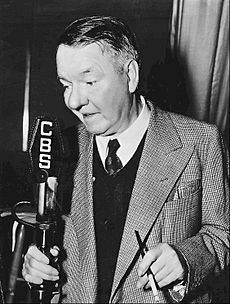
The next year, Steiger played the comedian W. C. Fields in the movie W. C. Fields and Me. Steiger read a lot about Fields to prepare for the role. He put a lot of effort into the film, but critics didn't like it.
Steiger played Pontius Pilate in the TV miniseries Jesus of Nazareth (1977). In 1978, he played a senator in F.I.S.T., with Sylvester Stallone. He also appeared in Love and Bullets, which was not well-liked. The next year, Steiger was a general in the war film Breakthrough. In The Amityville Horror (1979), Steiger played a troubled priest. Some critics felt he overacted in this role.
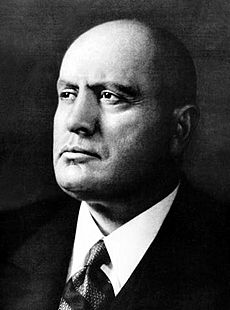
In 1980, Steiger was nominated for awards for his roles in two Canadian films, Klondike Fever and The Lucky Star. He played Mussolini again in Lion of the Desert, a film about the fight against the Italian army in Libya. This film was praised in Britain for its battle scenes. Later in 1981, Steiger won an award for Best Actor for his role as a rabbi in The Chosen.
Later Work and Final Years (1982–2002)
After heart surgery in 1979, Steiger faced health issues and depression in the 1980s. This affected his career, and he often took roles in smaller, independent films and TV shows. He admitted he accepted "everything I was offered" during this time. He wanted to keep working despite his problems. He later regretted some of the less good films he made. He felt sad when he wasn't acting. Major film studios were careful about hiring him because of his health. Steiger once advised a younger actor, "Never tell anyone if you've got heart problems, kid."
In 1984, Steiger starred in The Naked Face. He took a break from movies in the mid-1980s to appear in TV mini-series like The Glory Boys (1984) and Hollywood Wives (1985). Steiger also provided a voice for a song on Joni Mitchell's 1985 album Dog Eat Dog.
In 1987, Steiger was in the film Catch the Heat. In 1988, he and Yvonne De Carlo played an elderly couple in the horror film American Gothic. Towards the end of the 1980s, he played authority figures like a mayor in The January Man and a judge in Tennessee Waltz. Steiger said his performance in The January Man was "way over the top," but he enjoyed it. This marked a positive change after his depression.
In 1990, Steiger starred in Men of Respect, a crime drama based on Shakespeare's Macbeth. Critics did not like the film. Two years later, Steiger played another mobster, Sam Giancana, in the miniseries Sinatra (1992).
Steiger played a reverend in the film The Ballad of the Sad Café (1991). He also tried out for a role in Ron Howard's Far and Away. Steiger, who was bald, was asked to wear a wig for the audition. He was upset that Howard taped the audition. Steiger never forgave Howard for not giving him the part.
In 1993, Steiger starred in the horror film The Neighbor. Critics found it one of his creepiest roles. The next year, Steiger played a Cuban mob boss in the thriller The Specialist, with Sylvester Stallone and Sharon Stone. He said he took the role to show a new generation that he was still acting. Critics strongly disliked the film. Steiger was even nominated for a "Worst Supporting Actor" award for this role.
After The Specialist (1994), Steiger appeared in Tom Clancy's Op Center (1995) and a Columbo TV movie. The next year, he had a small role in the family drama Shiloh. He played the role again in the sequel three years later. Also in 1996, Steiger played a general in Mars Attacks!.
In 1997, Steiger played a mob boss named Tony Vago in Truth or Consequences, N.M.. Steiger played judges in two films in 1999: Crazy in Alabama and the prison drama The Hurricane. In The Hurricane, he played Judge H. Lee Sarokin, who was responsible for freeing the main character.
After a small role in End of Days (1999), Steiger was a lead actor in The Last Producer (2000). His last film role was as Nick, a billiard hall manager, in Poolhall Junkies (2002). This film was not well-received by critics.
Personal Life
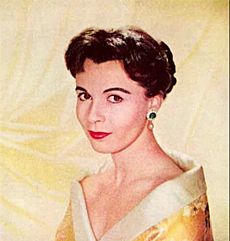
Rod Steiger was married five times. His wives were Sally Gracie (1952–1958), actress Claire Bloom (1959–1969), Sherry Nelson (1973–1979), Paula Ellis (1986–1997), and actress Joan Benedict Steiger (2000 until his death). He had a daughter, opera singer Anna Steiger (born 1960), with Claire Bloom. He also had a son, Michael Steiger (born 1993), with Paula Ellis. Steiger once said that Claire Bloom was "all I ever wanted in a woman." They bought homes in Malibu, California, Manhattan, and Ireland. It greatly upset him when his marriage to Bloom ended in 1969. Steiger was also good friends with actress Elizabeth Taylor.
After his third marriage ended in 1979, Steiger experienced deep depression. This was partly a side effect of his surgery. It negatively affected his career in the 1980s. He became very private during this time, often staying in his apartment and watching American football. Despite these challenges, Steiger continued to act. In one of his last interviews, he said that there was a wrong idea about depression. He explained it was caused by a chemical imbalance, not a mental illness. He said, "Pain must never be a source of shame. It's a part of life, it's part of humanity."
Death
Rod Steiger passed away on July 9, 2002, at age 77. He died from pneumonia and kidney failure. These were complications from surgery for a gall bladder tumor. He was buried in Forest Lawn – Hollywood Hills Cemetery in Los Angeles. The film Saving Shiloh, released in 2006, was dedicated to his memory.
Acting Style
Rod Steiger was known as one of Hollywood's most respected character actors. He was described as "one of Hollywood's most charismatic and dynamic stars." However, he often felt out of place in Hollywood. He believed that good actors struggled to find challenging roles as they got older. Steiger was known for his intense way of playing unusual, often wild characters. After On the Waterfront (1954), he often played tough guys and villains. He became frustrated with these roles because they didn't let him show his full talent.
Steiger was a product of the Actors Studio and was closely linked to method acting. This meant he deeply became the characters he played. He was so dedicated to his acting that he often worked in foreign films, especially in Italy. He did this to find the roles he wanted. However, he sometimes argued with directors about his method acting techniques. In one of his last interviews, Steiger said the greatest gift an artist can give is a "constructive, warm memory." He said, "when somebody says to me 'I'll never forget,' that's worth more to me than five Academy Awards."
Film writer Paul Simpson noted how carefully Steiger prepared for his roles. He could easily copy the mannerisms of figures like Mussolini. His powerful performances influenced many later actors. For example, Robert De Niro used Steiger's portrayal of Al Capone as inspiration for his own role in The Untouchables (1987). Elvis Presley was very impressed with Steiger's "powerful and wrenching performance" in The Pawnbroker.
Despite his talent, Steiger was sometimes accused of overacting. Critics, especially in the 1970s and 1980s, found his acting too much at times. They said it could be uncomfortable or even funny to watch.
Filmography and Theatre Credits
See also
 In Spanish: Rod Steiger para niños
In Spanish: Rod Steiger para niños
 | Roy Wilkins |
 | John Lewis |
 | Linda Carol Brown |


